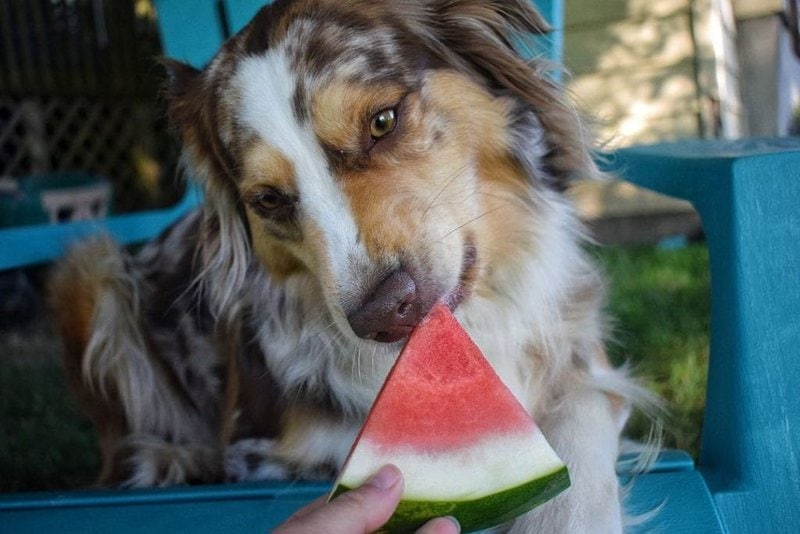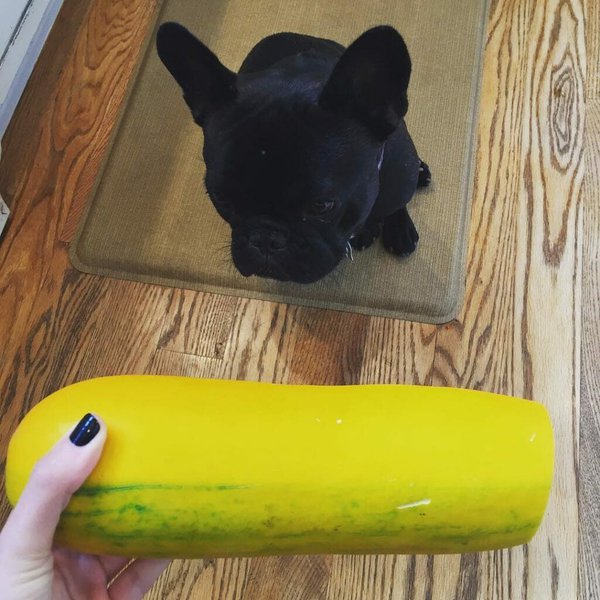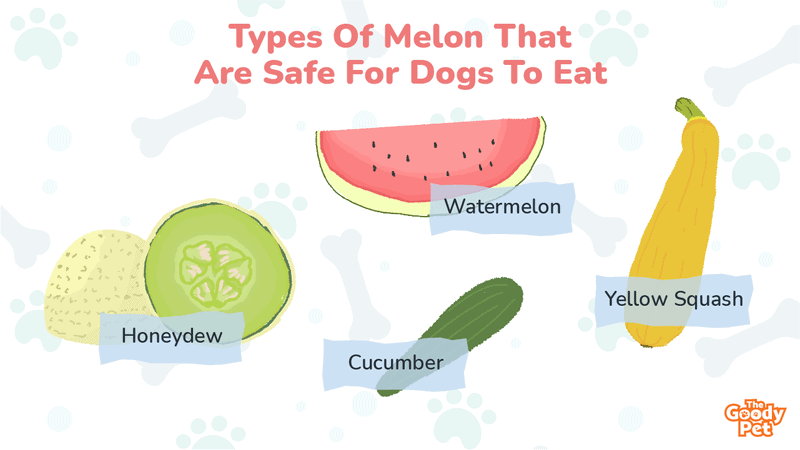Among the many varieties of fruits available, it can be confusing to decide which is the ideal fruit we can give to our dogs. Melons are one of the most satisfying and popular fruits to give to our furry pets, especially during those hot, summer days. A slice of one of those sweet, juicy fruits not only refreshes but also provides valuable nutrients like antioxidants, vitamins, essential minerals, and dietary fiber that our body needs.
On top of the beneficial nutrients it contains, the high water content of a melon is excellent in preventing dehydration when consumed particularly after a long walk or exercise. Melons are also perfectly safe for dogs to consume in moderation. Without the rind, skins and seeds, most melon types are considered safe for dogs to eat.
In this article, we will learn about the types of melons we can give to our pets, and the right way to serve them. Plus, we will look at the ideal amount of melon to feed your dog such that it will not lead to issues, such as diarrhea or abdominal pains.
What Melons Can Dogs Eat?
Melons belong to the plant family, Cucurbitaceae, characterized by their sweet and fleshy fruit. Among the most popular varieties of melons are honeydews, watermelon, and cantaloupes. Cucumber and squash are cousins of melons as they belong to the same Cucurbitaceae family.
All of these popular melon varieties are considered to be superfoods rich in nutrients and to be very beneficial for your dog. Still, there are safety tips, particularly on the serving method, to follow so that health issues, like choking, can be avoided.
Benefits Of Melons
All the varieties of melons are rich in vitamins, minerals, and antioxidants as briefly enumerated below:
- Vitamin C – Melons are packed with vitamin C which reduces free radicals in the body and helps minimize inflammation and cognitive aging.
- Vitamin B6 – This helps in the metabolism of amino acids and helps support proper bladder health.
- Vitamin B1 and B5 – They both help in tissue and muscle repairs, as well as for the metabolism of carbs and proteins.
- Potassium – This mineral helps in the proper functioning of your pooch’s heart, muscles, and nerves. Deficiency in potassium could lead to constant tiredness and loss of appetite.
- Iron and Copper – Melons have trace amounts of this mineral which promotes the formation of healthy red blood cells.
- Fiber – Melons are a great source of fiber that promotes digestive health.
- Vitamin A – Melons are also abundant with Vitamin A that helps improve your dog’s vision.
- Vitamin K for blood-clotting and quick healing of wounds. This also strengthens their bones, so they are less prone to injuries.
- Biotin is important because it maintains healthy skin and prevents allergies from forming.
Aside from the above nutrients that melons contain, it is also rich in minerals like potassium which aids in the proper functioning of the heart, nerves, and muscles.
Melon also contains fiber which keeps the digestive tract healthy, and it is a low-calorie treat with no fat or cholesterol.

Safety Tips In Giving Melons To Your Dog
Even if melons are rich in nutrients, remember that moderation is always the key. Too many fruits can result in diarrhea. Keep in mind that fruits are sweet treats, so, if you have a diabetic dog, it’s best to ask the advice of a vet regarding the right proportion of melon.
Another safety tip is to always serve fresh melon slices, instead of canned or dried ones, because they are often laden with sweeteners and preservatives.
Is Honeydew OK For Dogs?
Yes, honeydews are OK for dogs and are not considered toxic to them. It is a refreshing fruit generally available during the summer months and an ideal occasional treat, especially after a long walk or exercise, since it is 90% water.
Honeydew is similarly sweet as the cantaloupe but with a smoother rind and a green and more fibrous flesh.
Considering the high sugar content of honeydew, don’t go overboard by giving frequent and huge servings to your pooch. Are there precautions you need to know about? Let’s talk more about honeydews.
Can My Dog Eat Honeydew Melon Everyday?
No, honeydew shouldn’t be given everyday. This is because honeydew melons are very fibrous fruits, so feed your pooch only a moderate amount. It is ideal as an occasional treat but not as a regular snack.
Fiber is great for digestion, especially if your dog is suffering from constipation, but giving them too much may lead to some tummy problems, such as vomiting and diarrhea.
For small dogs, 1 to 2 bite-sized pieces is sufficient while medium to large dogs can consume around 4 to 5 bite-sized pieces.
Some owners might opt to replace a portion of their meal with some honeydew as a fiber supplement that could help their dog feel fuller, thus, lessening their need to eat more.
Sugar Content
Honeydews have a fair amount of fructose in them so be cautious feeding your pooch this fruit regularly, particularly if they are suffering from diabetes. Too much sugar in their diet, even if it is sourced from fruits, can lead to obesity and kidney failure among other health issues.
Precautions
When feeding your pooch honeydews, remember to give only the fleshy part and neither the seeds nor the rind.
Seeds are a choking hazard and can cause digestive issues if ingested in large amounts. It also is the same thing with the rind or skin which are tough and may cause choking and internal blockage even in small portions.
Is It OK To Give Dogs Watermelon?
Watermelons are OK to give to your dogs. Their sweet and juicy pulp packs a lot of punch when it comes to nutrients. Their mostly water content refreshes and quenches your pooches’ thirst, thereby preventing fatal heat stroke especially during warm weather.
Given that watermelons are rich in lycopene and vitamins, you shouldn’t feed your dog too much watermelon. Read on to find out how much watermelon is safe and what are the different ways you can serve this summer fruit to your pooch.
Lycopene Content
One of the main benefits of watermelons is their rich antioxidant ingredient called lycopene that gives the watermelon its crimson color. It works to remove free radicals from our dog’s bodies as well as improve their vision.
It is proven in research that dogs with cancer and heart diseases can benefit from lycopene and its anti-inflammatory properties help with your dog’s overall immunity. Although this phytonutrient is not an essential part of your dog’s nutrient, its benefits cannot be ignored.

How Much Watermelon Can I Feed My Dog?
Watermelons should only be considered as an occasional snack or treat. Giving excessive amounts to your pooch can lead to diarrhea or tummy pains.
The 10% rule should be your guiding principle whenever you feed fruits to your dog. That is, treats such as fruits should comprise 10% of your dog’s overall diet. ½ to 1 cup per serving of watermelons should be sufficient for your dog depending on its size and diet requirements.
What Other Ways Can I Serve Watermelons To My Dog?
Before serving watermelons to your pooch, be sure to remove the seeds and the rind or the white part of the watermelon. These parts of the watermelon could cause choking and intestinal blockages, especially for small dogs and puppies.
Aside from giving them the fresh bite-sized pieces of watermelons, you can also try feeding them frozen chunks of the fruit which can be a great treat during the summer months or puree the fruit and freeze it in ice cube trays.
Dehydrated watermelons are great chewy snacks for your dog. Just don’t forget to remove the seeds and the rind before placing the fruit in a dehydrating machine.
Can Cantaloupe Kill Dogs?
Some parts of the cantaloupe can be bad for your dog. But if served appropriately, the refreshing fruit is OK for your pooches and can be a healthy alternative treat or snack.
Similar to the other melon varieties, cantaloupes are also filled with vitamins, dietary fiber, niacin, folate, and potassium plus it is high in water content perfect for replenishing your pooch’s water needs.
Before sharing cantaloupe with your pooch, allow us to first share with you more information, such as the right proportion, the delicious ways of serving this fruit, and the dangers, if any, when you feed your pooch too much cantaloupe.
Are Cantaloupes Good For Dogs?
One of the main benefits of giving cantaloupes to your dogs is the presence of beta carotene that gives cantaloupes the distinctive orange color. Beta carotene is converted into vitamin A when metabolized and this helps to make our pet’s skin and coat healthy and more attractive.
Vitamin A also improves their eyesight and functions as an antioxidant that helps in preventing diseases.
Cantaloupes are also rich in vitamin C which similarly acts as an antioxidant and can slow cellular aging and slow down the onset of some diseases.
Folic acid or vitamin B9 is also present and is necessary for normal DNA synthesis and red blood cell formation. Other essential minerals in cantaloupes include potassium, zinc, copper, iron, niacin, vitamin K, and magnesium.

When Is Cantaloupe Dangerous?
Cantaloupes are only hazardous if you feed your pooch the seeds and the rind. Cantaloupe seeds can cause digestive problems especially if the seeds get lodged in the intestinal tract. Accidentally swallowing a few seeds can be harmless but a bunch could cause problems.
The tough outer rind is also not recommended for consumption. It can cause your dog to choke and can cause irritation if ingested. Do watch out if your pet licks the outer skin due to the presence of bacteria and fruit spray insecticides that could cause diarrhea, vomiting or tummy upsets.
How Do I Serve Cantaloupe To My Dog?
Before serving cantaloupes to your dogs, thoroughly wash the entire melon first, then remove the seeds and scoop out or slice the fleshy part from the rind. Cut it into small bite-sized pieces to avoid choking and serve.
Another option is to stick fruits inside interactive toys to provide mental stimulation.
How Much Cantaloupe Can I Give My Dog?
Give your dogs only moderate amounts of cantaloupe. It is best given as an occasional treat or snack but not as a main component of their diet.
Cantaloupes also have a high sugar content so refrain from giving this fruit if your dog is suffering from diabetes. Because of their high fiber content, overconsumption can cause your pooch to have diarrhea and digestive issues.
Can Dogs Eat Cucumbers?
Yes, dogs can eat cucumbers and can be a great crunchy treat or snack with many nutritional benefits. Cucumbers belong to the Cucurbitaceae family of plants like melons, but they are of a different species.
Cucumbers are known as Cucumis sativus while melons are Cucumis melo. Both are considered gourds but not all gourds are melons.
Let’s learn more about what the benefits are, is raw cucumber okay for your pooch, how much and how safe is too much cucumber.
Benefits Of Cucumbers
While we humans love to put cucumbers in our salads, cucumbers are also beneficial to your pooches because they are low-calorie foods with lots of vitamins and minerals plus it is low on sodium and fat.
It is also packed with water, so your dog can stay hydrated for a long time and is known to freshen your pet’s breath because of the presence of phytochemicals and phytonutrients.
Can My Dog Eat Raw Cucumbers?
Yes, you can give your dog fresh and raw cucumbers. Just make sure that you cut it in small portions to avoid choking. The fresh and crunchy texture of the fruit would surely be a treat for your pooches.
Some dog owners would boil the cucumbers first which is fine but that would lose its crunch. Also, pickled cucumbers are not recommended because they contain salt, sugar and vinegar which are toxic to your furry pets.
Is It Safe To Feed My Dog The Skin Of A Cucumber?
The skin can be given as well but some dogs can be sensitive to the skin as well as the seeds and could give some digestive problems. You can buy seedless cucumbers instead and it is equally fine as the regular ones.
How Many Cucumbers Can I Feed My Dog?
Again, it is always safe to follow the 10% rule when feeding your dog’s treats and snacks. Treats like fresh vegetables and fruits should only comprise 10% of their total diet.
For small dogs, a few slices totaling around ⅛ of a cup can be given while ¼ to ½ a cup can be given to medium to large dogs.
Is Yellow Squash Safe For Dogs?
Yes, yellow squash or any type of squash is safe and not toxic for dogs to eat. This vegetable, which is almost like zucchini except for its color, is filled with lots of vitamins and nutrients like folic acid, potassium, magnesium, and fiber.
Looking for fresh ideas on how you can serve yellow squash? Read on to check it out now.
How Do I Serve Yellow Squash?
The inside fleshy pulp is the preferred part of the yellow squash you can give your dog, so remove the skin and seeds first. Cut them into small pieces and cook or steam plainly with water without oil, salt or garlic which can be toxic for your dogs.
Giving the squash raw to your pet is not recommended because it is tough and may cause diarrhea or vomiting. When cooked, you can mash it and add it to your pet’s regular food or serve it as it is if your pooch likes it that way.

Can I Feed My Dog Yellow Squash Every Day?
Although yellow squash is healthy for your pooches, avoid giving too much of this veggie and opt for more moderate consumption. The high fiber content may cause diarrhea or stomach upsets if given every day.
If you are giving yellow squash for the first time to your pooches, start with small portions. This way you can monitor if they have some allergic reactions to the veggie, as well as digestive problems.
What Other Types Of Squash Can I Give My Dog?
Your pooch can be given other types of squash like zucchini, butternut squash, pumpkins, and acorn squash. Some squashes can be given raw like the zucchini, but other squashes should be cooked just like the yellow squash because their toughness could cause choking.
In addition, acorn squash should be given in moderation because too much of this can cause calcium oxalate stones to form within the kidneys.





